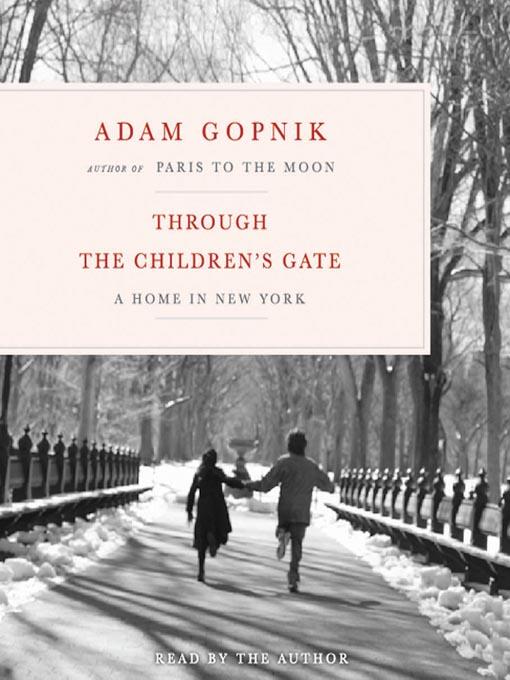
Through the Children's Gate
A Home in New York
کتاب های مرتبط
- اطلاعات
- نقد و بررسی
- دیدگاه کاربران
نقد و بررسی

Whether discussing the death of his daughter's fish or a visit to his psychiatrist, Adam Gopnik is a master of mining big revelations from small observations. But surprise! It's his narrative skills, not his literary skills, that steal the show in his new audiobook. As a narrator, Gopnik uses timing, tone, and coloring to bring alive this intimate and bittersweet collection of essays about family life in New York pre- and post-9/11. Gopnik, a self-confessed ham, is not afraid to dive into the voices, adding character and tone to, among others, his psypchiatrist, his children, and even local radio sports commentators. R.W.S. (c) AudioFile 2006, Portland, Maine

September 4, 2006
Back from living in Paris with his wife and two kids, as chronicled charmingly in Paris to the Moon
, Gopnik, a writer for the New Yorker
, records in his tidy, writerly and obsessive fashion his family's relocation to the city of his earliest professional aspiration: New York. No longer the grim, decrepit hell of the 1970s, New York of the new century has become a children's city, infused by a "new paternal feeling," and doting father Gopnik is delighted to walk through the Children's Gate of Central Park to relive the romance of childhood. His 20 various essays meander over topics dear to the hearts of New York parents, such as learning to be appropriately Jewish ("A Purim Story"); working with the ad hoc committee called Artists and Anglers at his son's hypercaring private school, on methods of flight for the production of Peter Pan
; and his four-year-old daughter's imaginary playmate, Charlie Ravioli, who is simply too booked to play with her. The less structured series of essays on Thanksgiving are most pleasing and read like diaries, ranging from the rage over noise to the safety of riding buses. Gopnik conveys in his mannered, occasionally gilded prose that New York still represents a kind of childlike hope—"for something big to happen." 150,000 copy first printing.

May 15, 2007
Given the title, one would expect a wonderful tour of New York City. Gopnik, who writes forThe New Yorker, does indeed refer to New York, occasionally, but he spends far more time philosophizing and talking about himself and his family, especially his favorite child, Luke, who coped with 9/11 by playing chess with "upper-crust players." Conversations with his children are unrealistic; they move from intellectual to extreme kiddie-speak. With such a focus, only a small number of listeners will identify with the author and his life. The family spent the entire summer planning a Harry Potter party and mocked those who didn't know that there were wizards in the stories. This book is really about one man's experiences and opinions; he's too wordy and gets carried away with small details. Naturally, Gopnik reads his own work, which is additionally painful since he reads very slowly; sometimes his delivery is rather halting. Recommended only for collections on New York writers.Susan G. Baird, Chicago
Copyright 2007 Library Journal, LLC Used with permission.

























دیدگاه کاربران